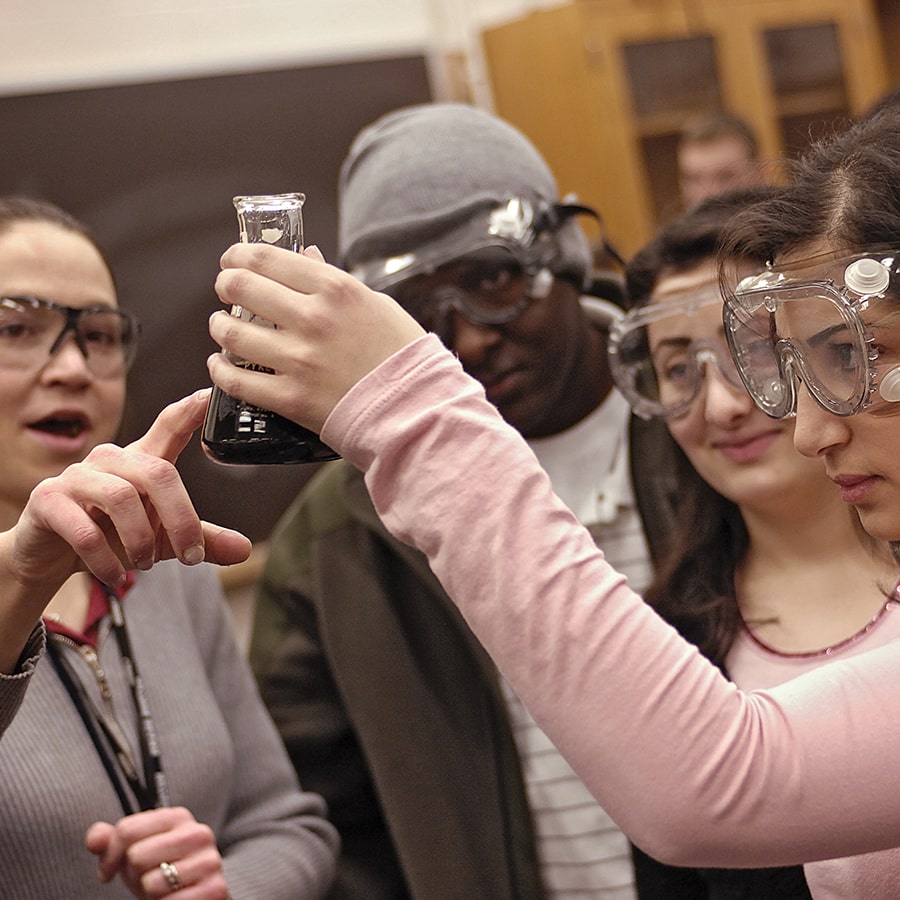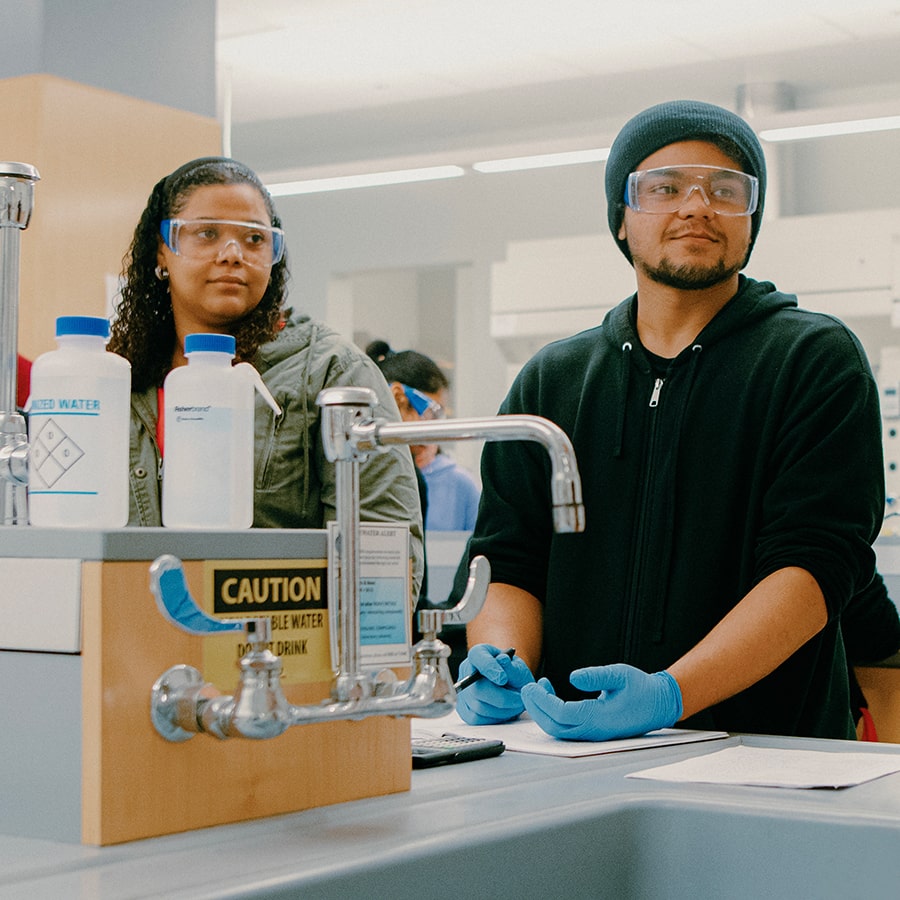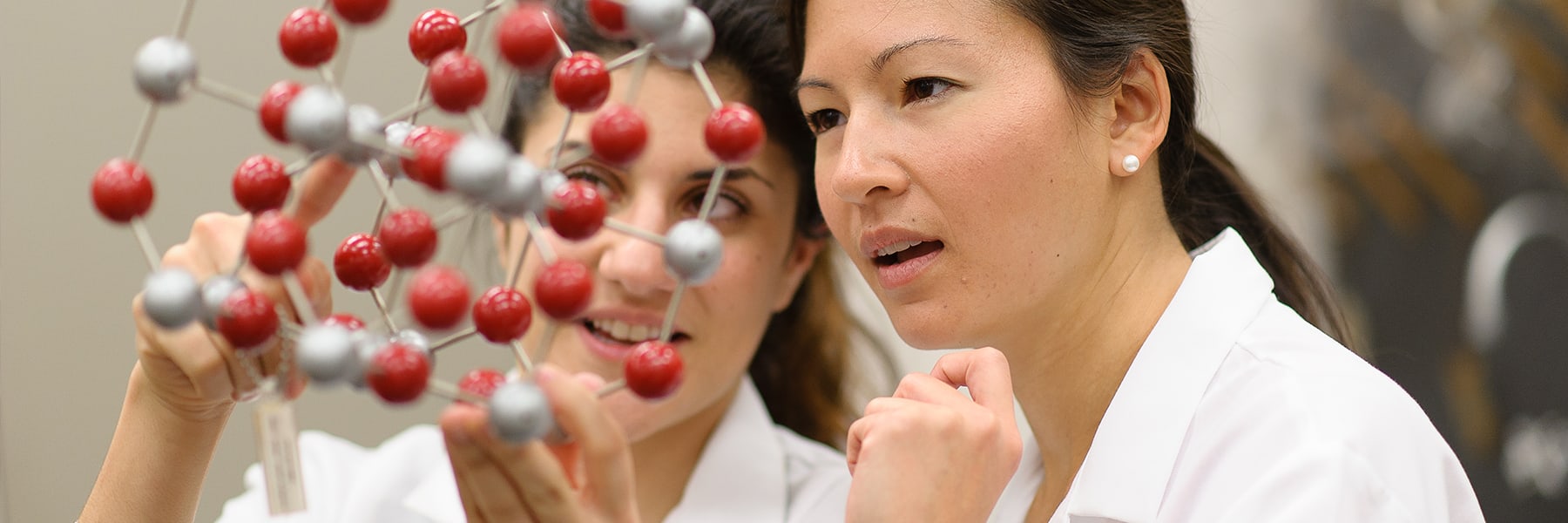Plan Your Education
How to Apply
Applicants must meet general graduate admission requirements in addition to the following program-specific requirements:
- Test Scores: GRE recommended
- Three Letters of Recommendation
- Statement of Purpose
Deadlines & Cost
Deadlines: April 1 (priority deadline) or June 15 (final deadline, if space available) for fall, October 1 (priority deadline) or November 1 (final deadline, if space available) for spring
Application Fee: The nonrefundable application fee is $75. UMass Boston alumni and current students that plan to complete degree requirements prior to graduate enrollment can submit the application without paying the application fee.
Program Cost Information: Bursar's website
Curriculum - Biological Track
COURSEWORK (Complete 60 credits.)
Students in the Biological Chemistry PhD track are required to take one core course, two core biological chemistry track courses, three elective courses, and at least six credits of Graduate Seminar and twenty credits of dissertation research. Of the three elective courses, one must be in the Chemistry Department, whereas up to two can be from other departments upon approval from the student's dissertation committee.
CORE COURSE IN CHEMISTRY PHD FOR ALL TRACKS (Choose one.)
CHEM 631 – Chemical Toxicology
CHEM 671 – Introduction to Green Chemistry
CORE COURSES IN BIOLOGICAL CHEMISTRY TRACK (Choose two from list.)
CHEM 658 – Medicinal Chemistry
CHEM 680 – Physical Biochemistry
CHEM 681 – Medical Biochemistry
ELECTIVE COURSES (Choose three from list.)
CHEM 601 – Thermodynamics and Kinetics
CHEM 602 – Quantum Mechanics
CHEM 611 – Organometallic Catalysis
CHEM 612 – Physical Inorganic Chemistry
CHEM 621 – Synthetic Organic Chemistry
CHEM 622 – Physical Organic Chemistry
CHEM 631 – Chemical Toxicology
CHEM 641 – Chemistry and Biochemistry Education Research
CHEM 651 – Spectroscopic Identification of Organic Compounds
CHEM 654 – Biological Chemistry
CHEM 658 – Medicinal Chemistry
CHEM 661 – Analytical Instrumentation
CHEM 662 – Applied Chemometrics
CHEM 666 – Electrochemistry
CHEM 671 – Introduction to Green Chemistry
CHEM 680 – Physical Biochemistry
CHEM 681 – Medical Biochemistry
CHEM 687 – Topics in Chemistry
CHEM 688 – Topics in Physical Chemistry
CHEM 689 – Topics in Organic Chemistry
CHEM 690 – Topics in Inorganic Chemistry
CHEM 696 – Independent Study
CHEM 697 – Special Topics in Chemistry
EXTRA-DEPARTMENTAL ELECTIVES
Students may choose electives from external departments if they are relevant to their course of study and research. Students choose courses with the permission of the advisor and Graduate Program Director.
Biology Department
BIOL 614 – Advanced Cell Chemistry
BIOL 678 – Protein Chemistry and Enzymology
BIOL 679 – Protein Chemistry and Enzymology Lecture
BIOL 685 – Biomedical Tracers
Physics Department
PHYSIC 601 – Electronic Instrumentation II: Digital
PHYSIC 612 – Electromagnetic Theory
PHYSIC 632 – Advanced Laser Optics (with lab)
PHYSIC 609 – Physics of Medical Imaging
PHYSIC 615 – Solid State Physics
PHYSIC 621 – Physics of Semiconductor Materials
School for the Environment
EEOS 611 – Applied Statistics
EEOS 640 – The Chemistry of Natural Waters
EEOS 710 – Environmental Biogeochemistry
EEOS 715 – Isotope Geochemistry
SEMINAR COURSES (Minimum of 6 credits)
CHEM 691 – Seminar I (fall)
CHEM 692 – Seminar II (spring)
DISSERTATION RESEARCH (Complete 20 credits.)
CHEM 899 – Dissertation Research
For more information on curriculum, including course descriptions and degree requirements, visit the Academic Catalog.
Curriculum - Green Track
COURSEWORK (Complete 60 credits.)
Students in the Green Chemistry PhD track are required to take two core courses, four elective courses, and at least six credits of Graduate Seminar and twenty credits of dissertation research. Of the four elective courses, at least two must be in the Chemistry Department, whereas up to the two remaining courses can be from other departments upon approval from the student's dissertation committee.
CORE COURSES (Both core courses are required.)
CHEM 631 – Chemical Toxicology
CHEM 671 – Introduction to Green Chemistry
ELECTIVE COURSES (Choose four from list.)
CHEM 601 – Thermodynamics and Kinetics
CHEM 602 – Quantum Mechanics
CHEM 611 – Organometallic Catalysis
CHEM 612 – Physical Inorganic Chemistry
CHEM 621 – Synthetic Organic Chemistry
CHEM 622 – Physical Organic Chemistry
CHEM 631 – Chemical Toxicology
CHEM 641 – Chemistry and Biochemistry Education Research
CHEM 651 – Spectroscopic Identification of Organic Compounds
CHEM 654 – Biological Chemistry
CHEM 658 – Medicinal Chemistry
CHEM 661 – Analytical Instrumentation
CHEM 662 – Applied Chemometrics
CHEM 666 – Electrochemistry
CHEM 671 – Introduction to Green Chemistry
CHEM 680 – Physical Biochemistry
CHEM 681 – Medical Biochemistry
CHEM 687 – Topics in Chemistry
CHEM 688 – Topics in Physical Chemistry
CHEM 689 – Topics in Organic Chemistry
CHEM 690 – Topics in Inorganic Chemistry
CHEM 696 – Independent Study
CHEM 697 – Special Topics in Chemistry
EXTRA-DEPARTMENTAL ELECTIVES
Students may choose electives from external departments if they are relevant to their course of study and research. Students choose courses with the permission of the advisor and graduate program director.
Biology Department<
BIOL 614 – Advanced Cell Chemistry
BIOL 678 – Protein Chemistry and Enzymology
BIOL 679 – Protein Chemistry and Enzymology Lecture
BIOL 685 – Biomedical Tracers
Physics Department<
PHYSIC 601 – Electronic Instrumentation II: Digital
PHYSIC 612 – Electromagnetic Theory
PHYSIC 632 – Advanced Laser Optics (with lab)
PHYSIC 609 – Physics of Medical Imaging
PHYSIC 615 – Solid State Physics
PHYSIC 621 – Physics of Semiconductor Materials
School for the Environment
EEOS 611 – Applied Statistics
EEOS 640 – The Chemistry of Natural Waters
EEOS 710 – Environmental Biogeochemistry
EEOS 715 – Isotope Geochemistry
SEMINAR COURSES (Minimum of 6 credits.)<
CHEM 691 – Seminar I (fall)
CHEM 692 – Seminar II (spring)
DISSERTATION RESEARCH (Complete 20 credits.)
CHEM 899 – Dissertation Research
For more information on curriculum, including course descriptions and degree requirements, visit the Academic Catalog.
Curriculum - Inorganic Track
COURSEWORK (Complete 60 credits.)
Students in the Inorganic Chemistry PhD track are required to take one core course, two core inorganic chemistry track courses, three elective courses, and at least six credits of Graduate Seminar and twenty credits of dissertation research. Of the three elective courses, one must be in the Chemistry Department, whereas up to two can be from other departments upon approval from the student's dissertation committee. For all courses see the university's Course Listings.
CORE COURSE IN CHEMISTRY PhD FOR ALL TRACKS (Choose one.)
CHEM 631 – Chemical Toxicology
CHEM 671 – Introduction to Green Chemistry
CORE COURSES IN THE INORGANIC CHEMISTRY TRACK (Choose two from list.)
CHEM 611 – Organometallic Catalysis
CHEM 612 – Physical Inorganic Chemistry
CHEM 690 – Topics in Inorganic Chemistry
ELECTIVE COURSES (Choose three from list.)
CHEM 601 – Thermodynamics and Kinetics
CHEM 602 – Quantum Mechanics
CHEM 611 – Organometallic Catalysis
CHEM 612 – Physical Inorganic Chemistry
CHEM 621 – Synthetic Organic Chemistry
CHEM 622 – Physical Organic Chemistry
CHEM 631 – Chemical Toxicology
CHEM 641 – Chemistry and Biochemistry Education Research
CHEM 651 – Spectroscopic Identification of Organic Compounds
CHEM 654 – Biological Chemistry
CHEM 658 – Medicinal Chemistry
CHEM 661 – Analytical Instrumentation
CHEM 662 – Applied Chemometrics
CHEM 666 – Electrochemistry
CHEM 671 – Introduction to Green Chemistry
CHEM 680 – Physical Biochemistry
CHEM 681 – Medical Biochemistry
CHEM 687 – Topics in Chemistry
CHEM 688 – Topics in Physical Chemistry
CHEM 689 – Topics in Organic Chemistry
CHEM 690 – Topics in Inorganic Chemistry
CHEM 696 – Independent Study
CHEM 697 – Special Topics in Chemistry
EXTRA-DEPARTMENTAL ELECTIVES
Students may choose electives from external departments if they are relevant to their course of study and research. Students choose courses with the permission of the advisor and Graduate Program Director.
Biology Department
BIOL 614 – Advanced Cell Chemistry
BIOL 678 – Protein Chemistry and Enzymology
BIOL 679 – Protein Chemistry and Enzymology Lecture
BIOL 685 – Biomedical Tracers
Physics Department
PHYSIC 601 – Electronic Instrumentation II: Digital
PHYSIC 612 – Electromagnetic Theory
PHYSIC 632 – Advanced Laser Optics (with lab)
PHYSIC 609 – Physics of Medical Imaging
PHYSIC 615 – Solid State Physics
PHYSIC 621 – Physics of Semiconductor Materials
School for the Environment
EEOS 611 – Applied Statistics
EEOS 640 – The Chemistry of Natural Waters
EEOS 710 – Environmental Biogeochemistry
EEOS 715 – Isotope Geochemistry
SEMINAR COURSES (Minimum of 6 credits.)
CHEM 691 – Seminar I (fall)
CHEM 692 – Seminar II (spring)
DISSERTATION RESEARCH (Complete 20 credits.)
CHEM 899 – Dissertation Research
For more information on curriculum, including course descriptions and degree requirements, visit the Academic Catalog.
Curriculum - Organic Track
COURSEWORK (Complete 60 credits.)
CORE COURSE IN CHEMISTRY PHD FOR ALL TRACKS (Choose one.)
CHEM 631 – Chemical Toxicology
CHEM 671 – Introduction to Green Chemistry
CORE COURSES IN ORGANIC CHEMISTRY TRACK (Choose two from list.)
CHEM 621 – Synthetic Organic Chemistry
CHEM 622 – Physical Organic Chemistry
CHEM 658 – Medicinal Chemistry
CHEM 689 – Topics in Organic Chemistry
ELECTIVE COURSES (Choose three from list.)
CHEM 601 – Thermodynamics and Kinetics
CHEM 602 – Quantum Mechanics
CHEM 611 – Organometallic Catalysis
CHEM 612 – Physical Inorganic Chemistry
CHEM 621 – Synthetic Organic Chemistry
CHEM 622 – Physical Organic Chemistry
CHEM 631 – Chemical Toxicology
CHEM 641 – Chemistry and Biochemistry Education Research
CHEM 651 – Spectroscopic Identification of Organic Compounds
CHEM 654 – Biological Chemistry
CHEM 658 – Medicinal Chemistry
CHEM 661 – Analytical Instrumentation
CHEM 662 – Applied Chemometrics
CHEM 666 – Electrochemistry
CHEM 671 – Introduction to Green Chemistry
CHEM 680 – Physical Biochemistry
CHEM 681 – Medical Biochemistry
CHEM 687 – Topics in Chemistry
CHEM 688 – Topics in Physical Chemistry
CHEM 689 – Topics in Organic Chemistry
CHEM 690 – Topics in Inorganic Chemistry
CHEM 696 – Independent Study
CHEM 697 – Special Topics in Chemistry
EXTRA-DEPARTMENTAL ELECTIVES
Students may choose electives from external departments if they are relevant to their course of study and research. Students choose courses with the permission of the advisor and Graduate Program Director.
Biology Department
BIOL 614 – Advanced Cell Chemistry
BIOL 678 – Protein Chemistry and Enzymology
BIOL 679 – Protein Chemistry and Enzymology Lecture
BIOL 685 – Biomedical Tracers
Physics Department
PHYSIC 601 – Electronic Instrumentation II: Digital
PHYSIC 612 – Electromagnetic Theory
PHYSIC 632 – Advanced Laser Optics (with lab)
PHYSIC 609 – Physics of Medical Imaging
PHYSIC 615 – Solid State Physics
PHYSIC 621 – Physics of Semiconductor Materials
School for the Environment
EEOS 611 – Applied Statistics
EEOS 640 – The Chemistry of Natural Waters
EEOS 710 – Environmental Biogeochemistry
EEOS 715 – Isotope Geochemistry
SEMINAR COURSES (Minimum of 6 credits)
CHEM 691 – Seminar I (fall)
CHEM 692 – Seminar II (spring)
DISSERTATION RESEARCH (Complete 20 credits.)
CHEM 899 – Dissertation Research
For more information on curriculum, including course descriptions and degree requirements, visit the Academic Catalog.
Curriculum - Physical/Analytical Track
COURSEWORK (Complete 60 credits.)
CORE COURSE IN CHEMISTRY PhD FOR ALL TRACKS (Choose one.)
CHEM 631 – Chemical Toxicology
CHEM 671 – Introduction to Green Chemistry
CORE COURSES IN PHYSICAL/ANALYTICAL TRACK (Choose two from list.)
CHEM 601 – Thermodynamics and Kinetics
CHEM 602 – Quantum Mechanics
CHEM 661 – Analytical Instrumentation
CHEM 688 – Topics in Physical Chemistry
ELECTIVE COURSES (Choose three from list.)
CHEM 601 – Thermodynamics and Kinetics
CHEM 602 – Quantum Mechanics
CHEM 611 – Organometallic Catalysis
CHEM 612 – Physical Inorganic Chemistry
CHEM 621 – Synthetic Organic Chemistry
CHEM 622 – Physical Organic Chemistry
CHEM 631 – Chemical Toxicology
CHEM 641 – Chemistry and Biochemistry Education Research
CHEM 651 – Spectroscopic Identification of Organic Compounds
CHEM 654 – Biological Chemistry
CHEM 658 – Medicinal Chemistry
CHEM 661 – Analytical Instrumentation
CHEM 662 – Applied Chemometrics
CHEM 666 – Electrochemistry
CHEM 671 – Introduction to Green Chemistry
CHEM 680 – Physical Biochemistry
CHEM 681 – Medical Biochemistry
CHEM 687 – Topics in Chemistry
CHEM 688 – Topics in Physical Chemistry
CHEM 689 – Topics in Organic Chemistry
CHEM 690 – Topics in Inorganic Chemistry
CHEM 696 – Independent Study
CHEM 697 – Special Topics in Chemistry
EXTRA-DEPARTMENTAL ELECTIVES
Students may choose electives from external departments if they are relevant to their course of study and research. Students choose courses with the permission of the advisor and Graduate Program Director.
Biology Department
BIOL 614 – Advanced Cell Chemistry
BIOL 678 – Protein Chemistry and Enzymology
BIOL 679 – Protein Chemistry and Enzymology Lecture
BIOL 685 – Biomedical Tracers
Physics Department
PHYSIC 601 – Electronic Instrumentation II: Digital
PHYSIC 612 – Electromagnetic Theory
PHYSIC 632 – Advanced Laser Optics (with lab)
PHYSIC 609 – Physics of Medical Imaging
PHYSIC 615 – Solid State Physics
PHYSIC 621 – Physics of Semiconductor Materials
School for the Environment
EEOS 611 – Applied Statistics
EEOS 640 – The Chemistry of Natural Waters
EEOS 710 – Environmental Biogeochemistry
EEOS 715 – Isotope Geochemistry
SEMINAR COURSES (Enroll in seminar every semester.)
CHEM 691 – Seminar I (fall)
CHEM 692 – Seminar II (spring)
DISSERTATION RESEARCH (Complete 20 credits.)
CHEM 899 – Dissertation Research
For more information on curriculum, including course descriptions and degree requirements, visit the Academic Catalog.
Learning Outcomes
- Students will demonstrate competency in several major sub-fields of chemistry through completion of a series of graduate-level courses and a literature presentation.
- Students will become experts in a narrowly focused area of chemical research.
- Students will be trained to plan, conduct and report results from original chemical research, including the importance of adhering to the principles of scientific ethics, with regard to use of sources, generating and reporting of data, and collaborating with colleagues.
- Students will be able to comprehend and communicate advanced chemical principles in both oral and written forms as applied to at least one of the major sub-fields of chemistry: organic chemistry, inorganic chemistry, physical chemistry, analytical chemistry, biochemistry, and chemical education.
- Students will develop their creative thinking and problem-solving skills.
- Students will become adept at communicating and promoting their research activities with the broad scientific community in the form of publications and presentations at national/international conferences.
- Students will be trained to think independently and develop their own ideas for planning, funding, and conducting original research in a specialized area of study.
- Students will develop an understanding of Green Chemistry and environmental responsibility.
- Students will receive training in good teaching practices.
Graduation Criteria
Complete a minimum of 60 credits from at least 15 courses including one core course, five track courses, six graduate seminars, and a minimum of 20 credits in dissertation courses.
Students must pass a literature seminar in the first year of study.
Track: Students must select a track from green chemistry, biological chemistry, organic chemistry, inorganic chemistry, or physical/analytical chemistry.
Doctoral candidacy: Pass four written qualifying exams (at least two of which are in the track), and an oral qualifying exam.
Dissertation: Candidates must complete and defend a dissertation based on original research.
Statute of limitations: Seven years.
Plan of Study
Year 1
- Four Courses
- Choose advisor
- Literature seminar
- Dissertation Committee
- Year 2
Year 2
- Two courses
- Continue research
- Begin WQEs
- Teaching & research evaluations
Year 3
- Continue research
- Complete WQEs
- Teaching & research evaluations
Year 4
- Continue research
- Complete QQEs
- Teaching & research
Year 5
- Finish research
- Write dissertation
- Defend dissertation
Contact
Graduate Program Director Marianna Torok (Green Chemistry)
marianna.torok [at] umb.edu
(617) 287-6199
Graduate Program Director Neil Reilly (Physical/Analytical Chemistry)
neil.reilly [at] umb.edu
(617) 287-4065
Graduate Program Assistant Rita Lam
graduate.chemistry [at] umb.edu
(617) 287-6190

Chemistry
Learn more about UMass Boston's Chemistry department, our research, and our faculty.
Explore the Department of Chemistry
College of Science & Mathematics
Learn more about the faculty, research, and programs that make up our College of Science and Mathematics.
Explore Now